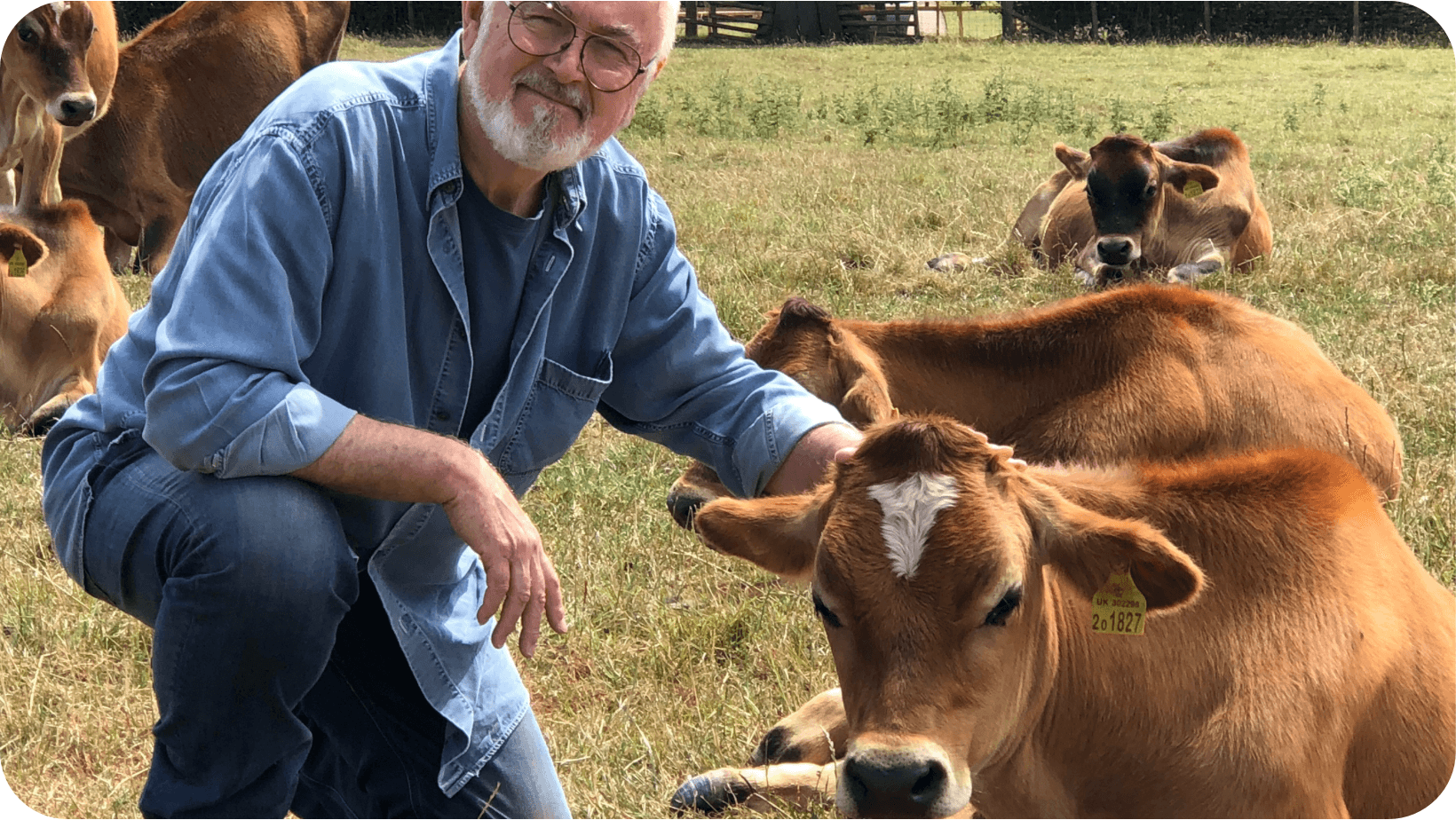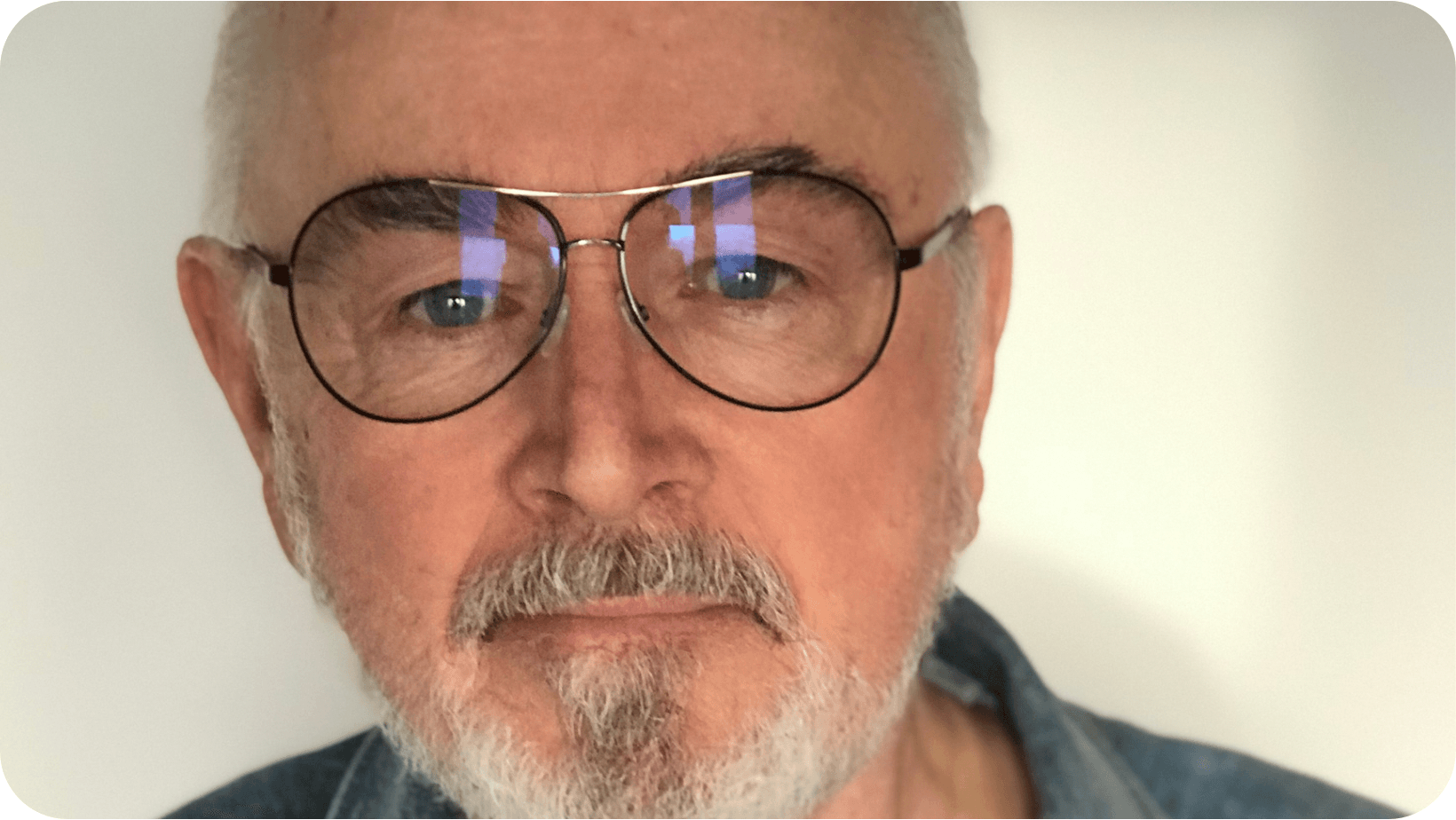International Animal Rights Day: Peter Egan's call for compassion
December 10th is a special day for animal lovers across the globe as we celebrate International Animals Rights Day: an awareness day highlighting the importance of animal rights and advocating for the ethical and humane treatment of animals.
We were thrilled at the opportunity to sit down and celebrate International Animal Rights Day with British actor and animal rights activist Peter Egan.
Peter is an English television and film actor most recognised for his long-standing role in Downton Abbey, where he refused to be filmed with animal products on his plate during filming, and more recently, acting alongside fellow animal rights activist Ricky Gervais in the popular Netflix series After Life.
Outside of the acting world, Peter has worked tirelessly behind the scenes as an ambassador for multiple foundations and charities, to bring about change for non-human species.
Peter is an ambassador for the Animals Asia Foundation, a charity that works to end cruelty to animals in Asia, and a proud patron of All Dogs Matter, Chaldon Animal Sanctuary and the science-based campaign For Life On Earth (FLOE), which fights against animal testing in the field of human medical research, to name a few.
Peter shares the highs and lows of utilising his platform as a public figure to advocate for animal rights.
V-Land UK (V-L): What began your journey into animal rights activism?
Peter Egan (PE): My late wife, Myra, and I started rescuing dogs over thirty years ago. Our journey through dogs introduced us to all other species on the planet. Dogs are wonderful companion animals, yet so badly treated in so many countries, including the UK. They're carelessly abandoned, they’re used for fights… I suppose we should be grateful that we don't use them as livestock as people do in many other countries.
My journey started with one dog in particular, a border collie spaniel that we rescued in 1999. He was a tiny little dog, he had a black coat and a white bib. He looked like he was wearing a dinner jacket, so I called him DJ. He was my gatekeeper.
DJ seemed to me to have a wonderful ability to communicate. Whenever I came home, he was waiting there for me by the door, and I would talk to him, and he listened. He also tilted his head to the side as if to say, ‘Yes, I'm agreeing with what you're saying.’ He was a remarkable communicator, my gatekeeper into a broad sentience, and a dimensioned compassion.
Through the journey with dogs, I discovered their mistreatment all over the world, particularly in Southeast Asia and Africa, where they are used for food. That made me start looking into intensive animal agriculture.
I watched a documentary called Earthlings about fourteen years ago, which is devastating, and produces all of the horror that you encounter in animals that are slaughtered for food. After I watched it, I couldn't speak for hours; I decided I would never eat animal products again.
That was a major door opener for me because I could understand how arbitrarily we harm animals, particularly when one is producing them for food.
V-L: What has been the most challenging aspect of animal rights activism for you?
PE: The most challenging part of being an animal rights activist is making people understand that they abuse animals without knowing it, on every level.
Take horse racing, for example. I don't understand how anyone who loves animals can love horse racing. People say the horses love it, but if you were to say to a horse, “Would you prefer to run the Grand National or be in a field with your friends?” They'd all say, “I'd prefer to be in a field with my friends”.
There is an accepted norm that you break an animal's spirit for fun. Horse racing would be an example as far as that's concerned, along with using elephants for entertainment, or any wild animal for entertainment.
The difficulty is trying to throw a net over the continuing abuse that we impose on all species on our planet and saying to someone, “Don't you recognise that as abuse? Don't you recognise that you are being cruel? That you're supporting cruelty if you pay for a donkey ride, or if you pay to go to a zoo, where a zoo is only a prison for wildlife?”
People say zoos have great conservation, and I'm sure there are vulnerable species that may have survived because of zoos, but then they will only live in zoos because they won't live in the wild. They're no longer wild animals. And so to me, the major problem is making people understand what animal advocacy is.

V-L: Have you experienced this in the other countries you’ve visited?
PE: I've been to many different countries and experienced this first-hand. I'm attached to so many different charities and observed the cruelty that exists in those countries, like Vietnam, China and Indonesia.
In Indonesia, I was at what they call an extreme market, where every species you could think of was being brutalised because people like it so fresh. I was talking to a dog meat trader who had dogs in cages that he was hooking out of the cages, and then stunning and blow torching alive.
“Would you eat the dog on your lap?” I said to him through a translator. “No, if I want to eat a dog,” he said, “I'll eat one from the cages.”
“What’s the difference?” I enquired. “This is my pet,” he replied, “the dogs in the cage are dog meat.”
The cognitive dissonance exposed in that situation is precisely the same if, say, someone who has a dog, has lamb, chicken, or turkey for their lunch.
V-L: Do you feel your platform as an actor helps with animal rights activism?
PE: Yes, I have a terrific platform and a shop window in which to share my commitment and my beliefs. And I'm delighted to say that it has enabled me to get a rather large following of people who care the same way as I do. I'm very uplifted by that. It's one of the great gifts about being relatively successful.
I've just become a patron for the Turgwe Hippo Trust, which a remarkable woman runs called Karen Paolillo. She and her husband, Jean-Roger in Zimbabwe, have been providing a sanctuary for hippopotamuses for the last thirty years; I’m so impressed with the work that she's doing.
Earlier this year, I visited South Africa and went to a rhinoceros orphanage. It was the first time I'd been to Africa, the first time I'd been in the wild. To see so many amazing wild animals existing peacefully in their habitat was breathtaking and inspiring to me, and touched my heart deeply.
Whether it be a beetle or a whale, I believe that every species has its own sentience, and its own language, and its own means of communication, and is of such value to our wonderful planet. We must find a way of living constructively and productively with our wildlife.

V-L: What have been the most rewarding aspects of animal rights activism for you?
PE: I am extremely lucky to be passionate about what I'm passionate about. I think commitment, discipline, and passion are all things that you have to work at, but in doing so, they become the greatest gift to your life, because they create an energy and a desire to achieve things that lots of people of my age may well have abandoned.
I am inspired by the people I observe who do the most thankless work in animal rights. They work so hard and they never give up.
Sharing the message has been the most rewarding thing. Many people write to me and say, “When you first started going on about veganism, I thought, ‘Oh, God, here we go again.’ Then I tried it and found I liked it; I felt better and healthier following a plant-based lifestyle.” I get lovely responses thanking me for that, which I appreciate because I came to veganism very late in my life.
I'm 77, and I probably started in full force about 12 years ago. I'd been a flexitarian, for want of a better word, up until my mid-60s. People say you can’t teach an old dog new tricks, but I’m living proof that you can. I feel better than I've ever felt.
V-L: What are three things people can do to help animals on International Animal Rights Day… or any day?
PE: Firstly, if you choose to have a companion animal in your life, think about it carefully. Research and understand why you want one. And if you answer, “I think having a dog will help me change my life”, then you are getting it for the wrong reason.
But if you research and then think, “I can offer this animal something and understand this animal more, and I think I will gain something remarkable from it.” I can assure anyone who thinks in that way that it’ll be true. They will get remarkable rewards by looking at their companion animal and trying to understand them, trying to understand their needs, not trying to dominate them or break their spirit, but encouraging its spirit to emerge.
Understand why you want to have a companion animal in your life. Understand that you're making a decision for life, and not just for as long as it's entertaining to you, or for as long as it isn't a burden.
Secondly, tap into your compassion, then allow that to grow, and look at other animals in the same way as you would look at your dog, cat, or animal you adore that occupies your life.
Look at other animals of any kind and see that they have precisely the same needs as your companion animal and would relate to you in precisely the same way your puppy relates to you. I think that would then lead you to examine whether you should be selective about who, and what, you choose to eat.
Thirdly, having opened that door, I would encourage anyone to walk into the room that is marked animal welfare or animal rights.
Then, try to understand that every other species on this planet has precisely the same rights as we do, as human animals. And that is a right to live a life free from fear, free from coercion, and free from abuse.
We couldn’t agree more. For more animal rights inspiration, check out creative career choices as activism, art as activism and Ed Winter’s interview on why he champions vegan activism.
Wishing you a very happy International Animal Rights Day from everyone here at V-Land UK.
